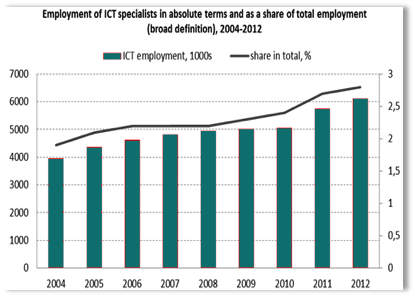
The development of the ICT working force in Europe between 2000 and 2012 was very dynamic having the job of these experts significantly grown in the European Union (EU). Most of the EU countries increased the share of specialised ICT employment - Portugal is among the countries with the lowest share of employees in this area.
According to the European Commission, Portugal has a power proportion than 2,5% of ICT employees, which is equivalent to the lower levels of the EU (shared by Romania, Lithuania, and Greece) and very distant from the average in EU27 (3,7%) and even further away from the countries with the best performances (Finland, Sweden, Malta, Slovakia, and the United Kingdom) where the percentage of ICT employees is over 5%.
Portugal continues to have the problem of active adult qualifications, which currently has a triple dimension:
- To fight the structural deficit of school qualifications;
- To consolidate a lifelong learning system;
- To promote a single certified training based on real qualification needs for the different territories and economic sectors.
Featured: In Portugal, we expect that by 2020 there may be 15000 job vacancies in ICT - about five times more than in 2012. End of feature
Hence, it is essential that learning instruments and models are modernised, thus conceiving and implementing an educational digital resource strategy promoting the creation, dissemination, and use of digital content in learning processes as to qualify the population for the ICT.

Fig. 1: Job Evolution in the ICT, in the EU, between 2004 and 2012.
In this way, considering the urgency to eliminate the estimated ICT job vacancies in 2020, it will be crucial to increase the supply of ICT professionals in Portugal, hence, contributing towards the development of Portuguese digital economy by stimulating at the same time economic growth.
The purpose of the Strategy and Action Plan for Digital Employability is to identify the initiatives to be addressed, related goals, aims, and responsible entities for this operation, so that we do not only eliminate the problem that is the lack of correctly oriented ICT professional skills, but we also create effective dynamics that will boost corporate competitive skills by taking advantage of market opportunities, aligning skills with the need for corporate growth, and anchoring a corporate development recognised by several stakeholders.
In brief, turning Portugal, before 2020, into an international ICT reference, by mobilising the main ICT actors in innovation processes, R&D, transferring knowledge, advanced training, development, production, and trading of products and services, marketing, and internationalisation.




